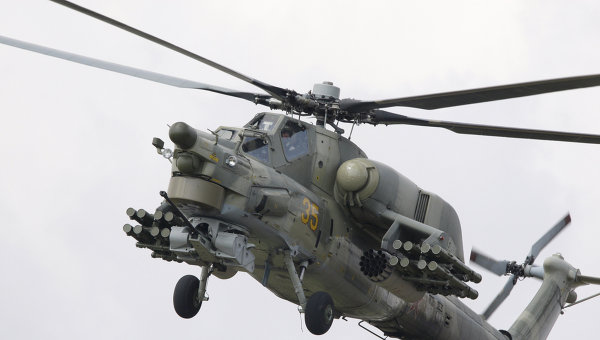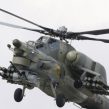
The Payment of Kickbacks—A Norm in Russia’s Arms Trade
Publication: Eurasia Daily Monitor Volume: 9 Issue: 210
By:

A month ago, during a state visit to Moscow by Iraqi Prime Minister Nouri al-Maliki, the Russian government officially announced that an “arms trade package” worth $4.2 billion was agreed. The “package deal” reportedly included the purchase of 30 Mi-28N attack helicopters and 42 Pantsir-S1 anti-aircraft artillery and guided missile systems. It was also announced that Iraq and Russia were discussing the possible additional purchase of a batch of MiG-29M1/M2 jet fighters (RIA Novosti, October 9). The sudden announcement last week in Bagdad that this deal may be canceled caused anger and dismay in Moscow (RIA Novosti, November 10).
In an interview with Russian state TV while in Moscow, al-Maliki affirmed that Iraq is fully independent in deciding which weapons to purchase from whom and that Russians have falsely assumed “Iraq to be the private property of the US and its allies” (RIA Novosti, October 13). In the Middle East, Russia has been selling weapons to Syria, but because of the civil war and sanctions the regime in Damascus at present lacks sufficient funds to make major purchases of expensive new weapons. The same applies largely to Iran, with its economy and finances crippled by sanctions. Algeria has been a major buyer of Russian weapons since 2005 when Moscow wrote off $4.7 billion of Cold War–era arms trade debt in an understanding that new contracts will exceed that sum. At present, that agreement has been largely fulfilled, and it is not clear whether Algeria will go ahead with new major contracts (VPK, April 18). The massive arms deal with Iraq was seen as a very important breakthrough into a market that Moscow once dominated during the rule of Saddam Hussein (RIA Novosti, October 9).
Last weekend, Maliki’s senior advisor Ali al-Moussawi announced the “package deal” had been scrapped due to suspicions of “corruption.” Maliki, according to Moussawi, had suspected foul play was involved in the arms deal with Russia already during his visit to Moscow and had ordered an investigation, which confirmed his suspicions. The same day, Iraq’s acting Defense Minister Saadun al-Dulaimi, who during this year several times visited Moscow to negotiate arms purchases, told journalists in Bagdad, “the deal is going ahead,” contradicting Moussawi (RIA Novosi, November 10). Finally, government spokesman Ali al-Dabbagh announced that Iraq’s National Security Council had decided to “fully renegotiate the deal to put an end to suspicions of corruption” and that a special committee will be formed to negotiate with Moscow (RIA Novosti, November 12).
The Russian press and government sources have accused Washington of using its influence in Bagdad to subvert the lucrative “package deal” (Kommersant, November 12). Iraq is recreating and rearming its army that was effectively dissolved after the US-led invasion in 2003 that ended Saddam’s rule. Iraqi oil production and export have been steadily growing. Iraq’s oil wealth is, in turn, fueling Iraq’s capabilities to purchase expensive new weapons systems, and Moscow wants to be part of that trade. Russia has been supplying the Iraqis with Mi-17 transport helicopters, but it was seen as very important to increase the scope of the weapons deals. Especially significant was the supposed deal to deliver the Mi-28N attack helicopters, since this would have been the first solid foreign order for a helicopter model that Russian arms traders have been unsuccessfully marketing for some time. Last year, the Indian defense ministry, despite its long-time close connections to Russian arms traders and producers, turned down an offer to buy Mi-28N helicopters and instead signed a contract to buy 22 Boeing AH-64D Apache Longbow helicopters for $1.4 billion. According to Russian experts, the Mi-28N—the Russian equivalent of the Apache Longbow—is still not fully developed, its night-capable radar is not yet functioning properly and its weapon systems are old-fashioned (RIA Novosti, October 25, 2011).
The very large sum of the “package deal” with Iraq and the inclusion of weapons, the effectiveness of which the Russian military has itself questioned, could indeed point to possible corruption. This week, Moussawi reportedly told RIA Novosti that a new committee has been formed to renegotiate the “package deal” because “the old one was compromised by allegations of corruption.” Moussawi insisted, “Washington did not apply any pressure to council the deal,” and talks will continue, since “we really need these weapons” (RIA Novosti, November 13). Of course, a “full renegotiation” means the old deal is effectively scrapped. The termination of the “old negotiating committee” apparently means the Iraqi defense ministry delegation that visited Moscow and promoted the deal is out of the picture, which may mean serious losses for Russian arms traders and the state budget.
Russia does not have any laws that criminalize bribing or paying commissions to foreign officials to promote them purchasing Russian arms. The payment of ten percent of the total sum of any given arms contact as a “commission to foreign intermediaries” is considered absolutely normal and legitimate, while sometimes the kickback may be much higher. In the case of the Iraqi “package deal,” the kickback, according to Russian experts, could have been $500 million or more (Nezavisimaya Gazeta, November 12). Cash down payments are often offered in advance as the deal is finalized and are backed by government financial guarantees that promote Russian high-tech exports.
In Russia, cash kickbacks—known locally as “otkat”—are widespread and considered the norm in any state budget procurement as well as in private commerce. In effect, the otkat forms the backbone of present-day Russian business culture, and this is sometimes a huge advantage when competing with Western corporations in Third World nations equally riddled with corruption and the widespread acceptability of kickbacks. In Iraq, all seemed to work out well, but then came the big snag—the regime in Bagdad is a loose coalition of differing and publicly quarreling fractions, and a sweet deal with one of them does not guarantee the rest are onboard. Large sums of money are up for grabs, and this in itself may have created tensions, becoming the main reason the “package deal” with Moscow got disrupted. RIA Novosti quotes Faleh A. Jabar, head of the Beirut-based Iraq Institute for Strategic Studies think tank: “The deal could have been frozen over a disagreement among corrupt Iraqi officials over who would get the commission for the deal” (RIA Novosti, November 13).




